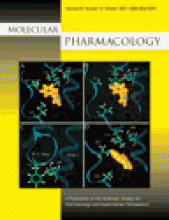Abstract
Alcohol is known to modulate the activity of a variety of neuroreceptors and ion channels. Recently, neuronal nicotinic acetylcholine receptors (nnAChRs) have become a specific focus of study because not only are they potently modulated by alcohol but also they regulate the release of various transmitters, including γ-aminobutyric acid (GABA) and dopamine, which play an important role in the behavioral effects of ethanol. Whereas the potency of normal alcohols (n-alcohols) to potentiate GABAAreceptors and to inhibitN-methyl-d-aspartate receptors increases with carbon chain length, we have found thatn-alcohols, depending on the carbon chain length, exert a dual action, potentiation and inhibition, on nnAChRs in primary cultured rat cortical neurons. The mechanism of dual action ofn-alcohols on nnAChRs was further analyzed using human embryonic kidney cells expressing the α4β2 subunits. Shorter chain alcohols from methanol to n-propanol potentiated acetylcholine (ACh)-induced currents, whereas longer chain alcohols from n-pentanol to n-dodecanol inhibited the currents. n-Butanol either potentiated or inhibited the currents depending on the concentrations of ACh and butanol. The parameters for both potentiation (log EC200) and inhibition (log IC50) were linearly related to carbon number, albeit with different slopes. The slope for potentiation was −0.299, indicating a change in free energy change (ΔΔG) of 405 cal/mol/methylene group, whereas the slope for inhibition was −0.584, indicating a ΔΔG of 792 cal/mol. These results suggest that potentiating and inhibitory actions are exerted through two different binding sites. Ethanol decreased the potency ofn-octanol to inhibit ACh currents, possibly resulting from an allosteric mechanism.
Footnotes
-
This work was supported by National Institutes of Health Grant AA07836.
- Abbreviations:
- NMDA
- N-methyl-aspartate
- GABA
- γ-aminobutyric acid
- nnAChR
- neuronal nicotinic acetylcholine receptor
- α-BuTX
- α-bungarotoxin
- n-alcohol
- normal alcohol
- AChR
- acetylcholine receptor
- HEK
- human embryonic kidney
- ACh
- acetylcholine
- Received March 23, 2001.
- Accepted June 13, 2001.
- The American Society for Pharmacology and Experimental Therapeutics
MolPharm articles become freely available 12 months after publication, and remain freely available for 5 years.Non-open access articles that fall outside this five year window are available only to institutional subscribers and current ASPET members, or through the article purchase feature at the bottom of the page.
|






